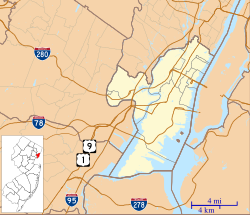Church of the Holy Innocents (Hoboken, New Jersey)
Church of the Holy Innocents | |
 | |
| Location | Willow Avenue and 6th Street, Hoboken, New Jersey |
|---|---|
| Coordinates | 40°44′38″N 74°2′1″W / 40.74389°N 74.03361°W |
| Area | 0.8 acres (0.32 ha) |
| Built | 1885 |
| Architect | Edward Tuckerman Potter; Henry Vaughan |
| Architectural style | Gothic, Shingle Style |
| NRHP reference No. | 77000871[1] |
| NJRHP No. | 1460[2] |
| Significant dates | |
| Added to NRHP | May 24, 1977 |
| Designated NJRHP | February 4, 1977 |
The Church of the Holy Innocents was an Episcopal church at Willow Avenue and 6th Street in Hoboken, Hudson County, New Jersey, United States. The congregation was founded in 1872.[3] It was built 1885 to the designs of Edward Tuckerman Potter and Henry Vaughan. The choir was added in 1913, the baptistery in 1932.[4] It was added to the National Register of Historic Places in 1977. It is no longer in use as a church but the building remains.
See also
References
- ^ "National Register Information System". National Register of Historic Places. National Park Service. March 13, 2009.
- ^ "New Jersey and National Registers of Historic Places - Hudson County" (PDF). New Jersey Department of Environmental Protection - Historic Preservation Office. July 7, 2009. p. 6. Archived from the original (PDF) on July 5, 2010. Retrieved March 15, 2010.
- ^ John J. Heaney, Church of the Holy Innocents, the Miniature Cathedral, Hoboken, New Jersey: Holy Innocents' Day, 1947, 75th Anniversary of Founding. Hoboken, New Jersey, self-published, 1947.
- ^ NJ - Hoboken: Church of the Holy Innocents, Flickr, Retrieved 5 May 2011. Excerpted from "The Church of Holy Innocents (Willow and 6th Street) was built in 1871 by the Stevens family in remembrance of their daughter Julia, who died in Rome at age seven from typhoid fever. Its design is taken from a small parish church in England, as was the Episcopal custom, and the architects were Edward Tuckerman Potter and Henry Vaughan. Potter's banded arches emphasize the polychromatic exterior of brownstone and white and red sandstone. The choir was added in 1913, the baptistery in 1932. Though no longer in use, the exterior details of this Episcopal church remains largely intact. New Jersey State Historic Register (1977) National Register #77000871 (1977)"



